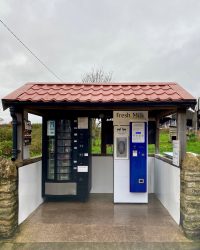How to set up & structure your milk vending machine business

24th March 2021
You have the appetite to retail your milk, have looked at the potential demand, where you might locate a vending machine, the costs of equipment needed, and the regulatory requirements to do it. But have you thought about the business structure?
There is no doubt that we are seeing a boom in milk vending machines across the country now. The consumer wants to get closer to the producer and know where their milk comes from, the automated vending machine allows that to happen without big labour requirements. Here are some of the key considerations to look at when planning or starting up such a venture.
Who is taking responsibility for the venture?
With social media presence dictating the success of milk vending machines, it’s common for the younger generation to take the lead in the venture. To allow the person responsible to be rewarded for success, an option is to take the vending machine out of the core business allowing it to be judged on its own merits, perhaps as a sole trade run by the person responsible.
This may be counter-intuitive as dividing the business up doesn’t bring farming families together. However, this approach allows business management skills to be developed –marketing, budgeting, supply purchasing –on a small scale with low risk to thefarming business. It also allows the results to be seen, which is a big motivational factor to making the business successful.
There are of course additional administrative factors with selling the milk to a separate business and splitting out costs, the simple way to get over this is to agree what stage the milk is sold in –pasteurised or raw –and an agreed price.
How does this affect milk contracts?
Milk vending will take time to build up demand, and your milk buyer will take the rest, or will they? Not all milk contracts are the same, and you will need to look at the wording of your contract carefully.
This can have a bearing on how a milk vending machine business is structured, as a contract may only allow the farmer to sell the milk directly to the public or may dictate the volume able to be sold even restricting it to none at all in some cases. This will have a bearing on how you structure the business.
What does it mean for VAT?
The immediate VAT concern will be the reclaim on the vending machine, and as milk is zero rated for VAT, this can be reclaimed as long as the business is VAT registered.
What may be overlooked is the sale of milk bottles where these are sold empty –these should have output VAT charged at 20% to the customer, whilst full milk bottles are zero rated.
These are three key areas that you should look at when embarking on a milk vending business, but consideration needs to be given to banking, insurance, food hygiene compliance as well.
If you would like to discuss your venture into a milk vending business or other farming business matters then please get in touch.

